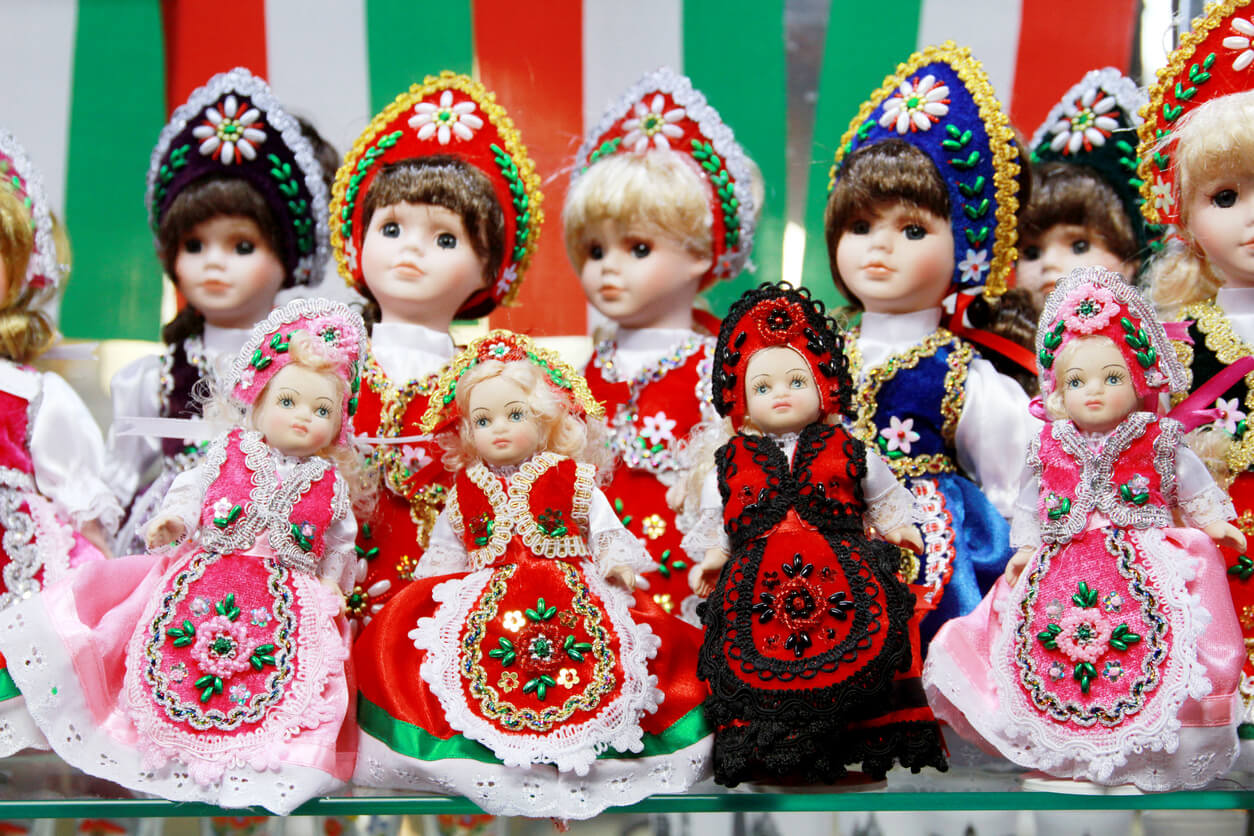Girl Names of Hungarian Origin: 53 Options with Their Meaning

Are you looking for girl names of Hungarian origin? Regardless of the reason that links you to this wonderful country (family ties or love for its culture), if this is your wish, you can’t miss the following list with the best options. Don’t miss it!
List of the best girl names of Hungarian origin
The Hungarian or Magyar people are an ethnic group of Eastern Europe whose origin is controversial. It has been said that they’re descendants of Scythians, Huns, Avars, or Turks, but this kind of kinship is based on medieval legends and not on substantial evidence.
Nowadays, thanks to linguistic studies, it’s thought that the presence of borrowings from Turkish may give logical reasons to think about the kinship of Uralic languages with Hungarian. In fact, the opposite is also the case. According to a study published in 2019 by the Electronic Journal of Research in Turkology, there are also words of Hungarian origin in the Turkish dictionary.
So, it’s a unique culture that doesn’t have to have an exact or close relationship with other territories. So, if you want a unique name of Hungarian origin, we suggest you choose one of these options that, without a doubt, will surprise you.
Girl names of Hungarian origin, from A to E
- Aggie: This is the Hungarian form of Agatha, which means “good.”
- Alida: This diminutive of Hungarian and Dutch origin comes from Adelaide. Therefore, it also alludes to a girl who’s “elegant and noble.”
- Aliz: Comes from Alice, which in French means “noble, elegant.”
- Anci: For a girl who’s “graceful.”
- Anna: A variant of Hannah. Undoubtedly, a very popular choice in Hungary for alluding to “favor, grace.”
- Anikó: Derived from Ana, it also refers to “grace.”
- Bárbara: Alludes to a “foreign woman.” Such is its popularity that even the most important Hungarian queen in the largest territory of Central Europe in the first half of the 15th century went by this name, according to a work developed in 2021.
- Bozsi: Comes from Erzsébet, meaning “God is my oath.”
- Brosca: In line with the previous option, it’s the Hungarian form of Bárbara. Therefore, it also means “stranger.”
- Cili: The diminutive of Cecilia, patron saint of music.
- Csilla: Alludes to a “star.”
- Darda: Means “dart, arrow.”
- Dorina: Alludes to a “gift from God.” In this regard, it’s a very popular name in Hungary.
- Emma: Although this name has Germanic roots, it also triumphs in this region and means “universal.”
- Erzebet: This is another variant of Elizabeth. Therefore, it also means “God is my oath.”
- Evacska: means “life.”

Girl names of Hungarian origin, from F to I
- Frici: This is the Hungarian form of Fredika. In this regard, it also alludes to a “peaceful ruler.”
- Gavrila: Means “God is my strength.”
- Gitta: Means “pearl.”
- Gryta: This name has the same meaning as the previous option because it’s also a variant of Margaret.
- Hajna: Means “grace.”
- Ibolya: Means “violet.”
- Ilka: Means “light.”
- Ilona: Some think this name may be the Hungarian variant of Helena, but it’s also possible to relate this name to the Finnish word ilona (“joy for someone”). Within traditional Magyar folklore, Ilona is the Queen of the Fairies.
- Irenke: the perfect name for a “peaceful” child.
- Ivett: The Hungarian variant of the French name Yvette.
Discover: 31 Czech Names for Girls
Hungarian girl names, from J to P
- Julinka: This is the Hungarian variant of Julia, alluding to one who is “youthful.”
- Katalin: Means “pure.”
- Kinga: Is the Hungarian variant of Kunigunde. In this regard, it’s thought to mean “family battle,” although some believe it may come from Polish to refer to one who’s “reckless in battle.”
- Kriszta: Alludes to a “Christian” girl.
- Léna: Comes from Lena, which means “light, bright.”
- Lenci: Means “light.”
- Lilla: This is one of the variants of Lily.
- Liza: Refers to one who’s “consecrated to God.”
- Luca: In Hungary, it’s a feminine option that comes from Lucas. That is, it would allude to the “light bearer.”
- Magdolna: This name comes from Magdalena.
- Marika: Alludes to “grace.”
- Mariska: Is related to Mary, the “chosen one.”
- Mira: In Slavic, it means “peace.” Therefore, it’s more likely that the meaning in Hungarian also comes from here.
- Nóra: A diminutive of Eleonora, which in turn means “light.”
- Nusa: Refers to a “graceful” child.
- Orsolya: Means “little bear or horse.”
- Piroska: Is the Hungarian variant of Priscilla. Therefore, it also means “ancient.”
Don’t miss: Compound Names for Girls: Classic and Modern

Girl names of Hungarian origin, Q to Z
- Roza: Alludes to the lily or rose flowers.
- Sarika: For the “princess” of the house.
- Teca: Is the Hungarian variant of Teresa. That is, it also means “to harvest.”
- Tunder: Alludes to a “fairy.” Undoubtedly, a name full of magic.
- Vilma: This is the feminine variant of the name Vilmos, which alludes to the “helmet of will.”
- Virag: Alludes to a beautiful “flower.”
- Zita: This is the nickname of Felitas. Therefore, it refers to a “happy” little one.
- Zoé: This is the Hungarian variant of the Greek name that carries the meaning of “life.”
- Zsizsi: This is another variant of Erzsébet, which means “God is my oath.”
- Zsófia: Comes from Sophia, a Greek name that alludes to “wisdom.”
Hungary, a country full of uniqueness represented in these names for girls
“An original language, a singular history, a distinct identity. Hungary, in the 21st century, demonstrates some of the keys to the contemporary phenomena of identity construction as a historical process of a social and cultural nature“.
– Sergio Fernández Riquelme & Miklós Cseszneky (2021) –
The words of these two great researchers and historians are mentioned because all these characteristics that they outline about the Hungarian people are reflected in these wonderful names. We hope that one of them has touched your heart. If so, which one should you choose? Let us know in the comments!
Are you looking for girl names of Hungarian origin? Regardless of the reason that links you to this wonderful country (family ties or love for its culture), if this is your wish, you can’t miss the following list with the best options. Don’t miss it!
List of the best girl names of Hungarian origin
The Hungarian or Magyar people are an ethnic group of Eastern Europe whose origin is controversial. It has been said that they’re descendants of Scythians, Huns, Avars, or Turks, but this kind of kinship is based on medieval legends and not on substantial evidence.
Nowadays, thanks to linguistic studies, it’s thought that the presence of borrowings from Turkish may give logical reasons to think about the kinship of Uralic languages with Hungarian. In fact, the opposite is also the case. According to a study published in 2019 by the Electronic Journal of Research in Turkology, there are also words of Hungarian origin in the Turkish dictionary.
So, it’s a unique culture that doesn’t have to have an exact or close relationship with other territories. So, if you want a unique name of Hungarian origin, we suggest you choose one of these options that, without a doubt, will surprise you.
Girl names of Hungarian origin, from A to E
- Aggie: This is the Hungarian form of Agatha, which means “good.”
- Alida: This diminutive of Hungarian and Dutch origin comes from Adelaide. Therefore, it also alludes to a girl who’s “elegant and noble.”
- Aliz: Comes from Alice, which in French means “noble, elegant.”
- Anci: For a girl who’s “graceful.”
- Anna: A variant of Hannah. Undoubtedly, a very popular choice in Hungary for alluding to “favor, grace.”
- Anikó: Derived from Ana, it also refers to “grace.”
- Bárbara: Alludes to a “foreign woman.” Such is its popularity that even the most important Hungarian queen in the largest territory of Central Europe in the first half of the 15th century went by this name, according to a work developed in 2021.
- Bozsi: Comes from Erzsébet, meaning “God is my oath.”
- Brosca: In line with the previous option, it’s the Hungarian form of Bárbara. Therefore, it also means “stranger.”
- Cili: The diminutive of Cecilia, patron saint of music.
- Csilla: Alludes to a “star.”
- Darda: Means “dart, arrow.”
- Dorina: Alludes to a “gift from God.” In this regard, it’s a very popular name in Hungary.
- Emma: Although this name has Germanic roots, it also triumphs in this region and means “universal.”
- Erzebet: This is another variant of Elizabeth. Therefore, it also means “God is my oath.”
- Evacska: means “life.”

Girl names of Hungarian origin, from F to I
- Frici: This is the Hungarian form of Fredika. In this regard, it also alludes to a “peaceful ruler.”
- Gavrila: Means “God is my strength.”
- Gitta: Means “pearl.”
- Gryta: This name has the same meaning as the previous option because it’s also a variant of Margaret.
- Hajna: Means “grace.”
- Ibolya: Means “violet.”
- Ilka: Means “light.”
- Ilona: Some think this name may be the Hungarian variant of Helena, but it’s also possible to relate this name to the Finnish word ilona (“joy for someone”). Within traditional Magyar folklore, Ilona is the Queen of the Fairies.
- Irenke: the perfect name for a “peaceful” child.
- Ivett: The Hungarian variant of the French name Yvette.
Discover: 31 Czech Names for Girls
Hungarian girl names, from J to P
- Julinka: This is the Hungarian variant of Julia, alluding to one who is “youthful.”
- Katalin: Means “pure.”
- Kinga: Is the Hungarian variant of Kunigunde. In this regard, it’s thought to mean “family battle,” although some believe it may come from Polish to refer to one who’s “reckless in battle.”
- Kriszta: Alludes to a “Christian” girl.
- Léna: Comes from Lena, which means “light, bright.”
- Lenci: Means “light.”
- Lilla: This is one of the variants of Lily.
- Liza: Refers to one who’s “consecrated to God.”
- Luca: In Hungary, it’s a feminine option that comes from Lucas. That is, it would allude to the “light bearer.”
- Magdolna: This name comes from Magdalena.
- Marika: Alludes to “grace.”
- Mariska: Is related to Mary, the “chosen one.”
- Mira: In Slavic, it means “peace.” Therefore, it’s more likely that the meaning in Hungarian also comes from here.
- Nóra: A diminutive of Eleonora, which in turn means “light.”
- Nusa: Refers to a “graceful” child.
- Orsolya: Means “little bear or horse.”
- Piroska: Is the Hungarian variant of Priscilla. Therefore, it also means “ancient.”
Don’t miss: Compound Names for Girls: Classic and Modern

Girl names of Hungarian origin, Q to Z
- Roza: Alludes to the lily or rose flowers.
- Sarika: For the “princess” of the house.
- Teca: Is the Hungarian variant of Teresa. That is, it also means “to harvest.”
- Tunder: Alludes to a “fairy.” Undoubtedly, a name full of magic.
- Vilma: This is the feminine variant of the name Vilmos, which alludes to the “helmet of will.”
- Virag: Alludes to a beautiful “flower.”
- Zita: This is the nickname of Felitas. Therefore, it refers to a “happy” little one.
- Zoé: This is the Hungarian variant of the Greek name that carries the meaning of “life.”
- Zsizsi: This is another variant of Erzsébet, which means “God is my oath.”
- Zsófia: Comes from Sophia, a Greek name that alludes to “wisdom.”
Hungary, a country full of uniqueness represented in these names for girls
“An original language, a singular history, a distinct identity. Hungary, in the 21st century, demonstrates some of the keys to the contemporary phenomena of identity construction as a historical process of a social and cultural nature“.
– Sergio Fernández Riquelme & Miklós Cseszneky (2021) –
The words of these two great researchers and historians are mentioned because all these characteristics that they outline about the Hungarian people are reflected in these wonderful names. We hope that one of them has touched your heart. If so, which one should you choose? Let us know in the comments!
All cited sources were thoroughly reviewed by our team to ensure their quality, reliability, currency, and validity. The bibliography of this article was considered reliable and of academic or scientific accuracy.
- Batisz, M. (2019). Palabras de origen húngaro en el diccionario turco. Sanal Türkoloji Araştırmaları Dergisi , 4 (4), 1–6. https://dergipark.org.tr/en/pub/stad/issue/64235/580693
- Fernández Riquelme, S., & Cseszneky, M. (2017). Hungría y la construcción histórica de la Identidad. Del lenguaje al discurso. La Razón histórica. https://digitum.um.es/digitum/handle/10201/52725
- Zalokar, P. (2021). Barbara Celjska – vladarica Evrope : (študija primera). Nova Univerza – Fakulteta za državne in evropske študije.
This text is provided for informational purposes only and does not replace consultation with a professional. If in doubt, consult your specialist.








